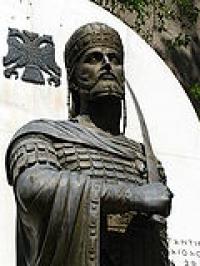Home | former monarchy | List of Byzantine emperors
|
|
|
This list begins with Constantine the Great, the first Christian Roman Emperor, who founded Constantinople, and who was regarded by the later Byzantine Emperors as the model ruler. Diocletian before him is sometimes considered the first "Byzantine" Emperor in a political sense, as he replaced the republican trappings of the office with a straightforward autocracy, marking the transition from the Principate to the absolutist Dominate, a more typically oriental and Hellenistic form of monarchy that would characterize the Empire. It was under Constantine however that the major characteristics of the Byzantine state emerged: a Roman polity centered at Constantinople and culturally dominated by the Greek East, with Christianity as the state religion. All Byzantine Emperors regarded themselves as Roman Emperors, the term "Byzantine" being coined firstly by Western historiography much later, in the 16th century. Although the barbarian West recognized the Eastern Empire's claim to the Roman legacy for several centuries, on 25 December 800, Pope Leo III crowned King of Franks Charlemagne as the Roman Emperor (which eventually led to the formation of the Holy Roman Empire) due to uneasy relations with the Orthodox East, an act which was much resented by the Byzantines. This happened after the coronation of Empress Irene, who, as a woman, was not recognized by the Pope of Rome to have a right to the throne. The title of all Emperors listed preceding Heraclius was officially Augustus, although various other titles such as Dominus were used as well. For official purposes, their names were preceded by Imperator Caesar and followed by Augustus. Following Heraclius, the title commonly became the Greek Basileus (Gr. Βασιλεύς), which had formerly meant generally "king", "sovereign" but now was used in place of Imperator. Following the establishment of a rival Empire in Western Europe (the Holy Roman Empire), the title Autokrator (Gr. Αυτοκράτωρ) was also increasingly used. In the later centuries of the Empire, the emperor could be often referred to by Western Christians as the "Emperor of the Greeks," though they still considered themselves "Roman" Emperors. Towards the end of the Empire, they referred to themselves as "[Emperor's name] in Christ, Emperor and Autocrat of the Romans." :For previous emperors, see List of Roman emperors |




 RSS
RSS